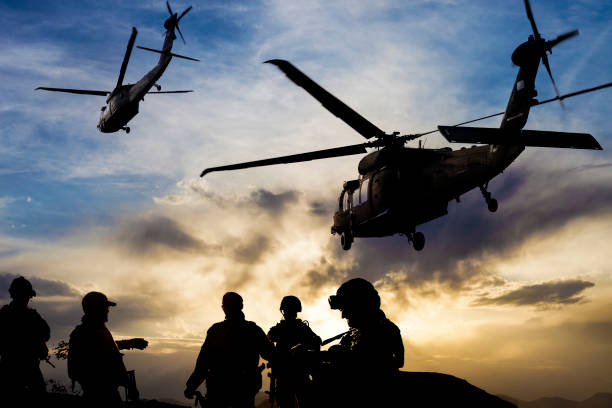The Afghanistan Conflict: Looking Through the Eyes of BIC Youth
Silhouettes of soldiers during Military Mission at dusk
September 14, 2021
For nearly two decades, the United States was involved in its longest war to date: the War in Afghanistan. On December 17th, 2001, just a couple of months after the attacks on 9/11, U.S. and allied forces drove the Taliban from power in Afghanistan. Nearly twenty years later, on April 14th, 2021, the U.S. announced that they had planned to remove themselves completely from Afghanistan. Just shortly before the 20 year anniversary of 9/11 ,the Taliban, before the U.S. had even left, gained complete control over Afghanistan after a 19+ year hiatus of power. During this regeneration of absolute power, civilians in Afghanistan were desperately rushing to leave the country, out of fear for themselves and loved ones. As people were flooding the airport in Kabul, a bombing took place, killing 60 Afghan citizens and 13 U.S. soldiers.
The United States military as well as its allies have now left Afghanistan, but if you’ve been listening lately, perhaps even if you haven’t been, you’ll know that nealy every soul in our nation has piped in to relay their perspectives and problem-solving philosophies on this devastating topic. It’s a human rights issue, it’s an national and international politics issue, it’s everything in and out of each crack and crevice of socio-political round tables—-spoken of in high and low places, across House of Chamber seats and stools of supper-time alike. Needless to say, there are no simple answers to complex problems, and vice versa; that applies here. There is no easy answer to what could have been and should be done in Afghanistan.
As a student in an era of constantly streaming connectivity, among other things, I felt a need to capture the thoughts and emotions of students at Buffalo Island Central, concerning the recent events in and out of Afghanistan. So, I searched for three individual students within the Overton Window, with varying voices and opinions, and inquired into their minds of and about the difficult situation.
The first was Juleigh Webster, a senior here at Buffalo Island Central. She had this to say: “I don’t like the way [the Taliban] treat women and children. I don’t like their tactics, they’re violent. I hardly see them as any kind of government.” When asked about Biden’s response she said,”I don’t agree with the administration’s response, but it’s a hard decision to make. I think there would have been a different reaction if Trump had done it, amongst Americans. They would have congratulated him, but not Biden.” She continued,”We shouldn’t have left weapons. We need to make sure they cannot use them. People are scared of a second 9/11. It’s scary… It’s disgusting, the segregation of women, the inequality.”
Caden Howard, another senior at BIC had this to say: “We should’ve evacuated faster. Those thirteen soldiers wouldn’t have had to die. I don’t know why our equipment was left either.” When asked about the Kabul-Airport incident, he said this: “I don’t know if there was anything we could’ve done to prevent [the Kabul Airport incident], besides evacuating—-that’s why those thirteen soldiers died.” He continued on, this time concerning the administration: “I don’t think Biden’s response was very good. He’s not defending the nation and he doesn’t seem to think he has done anything wrong.” When asked what he thought could be done for students in Afghanistan, he said,“There’s not much we can do. We can only try to understand.”
Christa Worthey, a junior at BIC had this to say about the situation: “We could have worked a little harder to get civilians out [of Afghanistan]. It’s hard to see how they are ruling in Afghanistan. It’s also scary that they have access to U.S. equipment, even if they don’t know how to use some of it. The fact that they took over so easily, how quickly they did it, it’s terrifying.” When asked about Biden’s decision to remove the U.S. from Afghanistan, she said this: “It was extremely dangerous to keep the soldiers there, but if we had taken more precautions we could have kept them there longer and kept more people safe. I understand the decision to take them out, it was important to get them out. As the younger generation, we have social media power—-we could help a large amount of people.” Continuing on, now about what we can do as a nation: “We need to stop seeing the refugees as villains, they are just trying to stay alive. I’ve seen videos of people running towards the airports, rushing to get out. There was one video of a woman, handing her baby to a marine over a wall. They are trying to get out of a bad situation where they will lose all their basic human rights.”
That which is happening now, in Afghanistan and to its people, is demonstrably reprimandable. We watch in horror, engendered by an influx of uncertain anger, not knowing where to direct it to, all from the comfort of our own homes. There is little we can do but speak up, to have our government hear our canary cries, whether that be to help or to forget, to have them listen to our every demand. But if we as a people feel securely safe and content, and our government feels safe having left Afghanistan, there is nothing much our nation will do. At that point, we can only try to understand. We can empathize with the Afghan people, send over sympathies, try to place our feet deep into the sandy terrain of Afghanistan and try to imagine what it is to exist under such rule as the Taliban.



